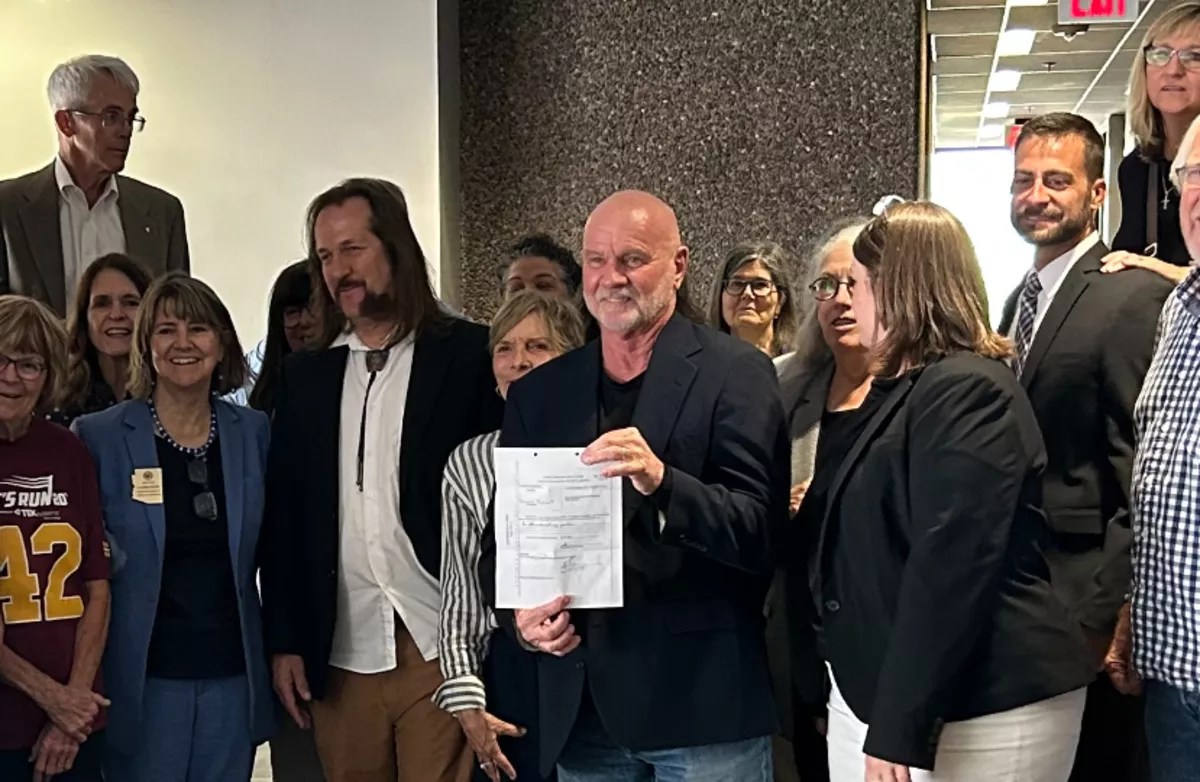
TJ L’Heureux

Audio By Carbonatix
The city of Tempe has dropped a criminal charge it brought against a local activist for feeding unhoused people in a city park without a permit, a surprising about-face after more than a year of ramped-up enforcement that targeted advocates for the homeless.
The activist in question is Ron Tapscott, whom the city charged in January with a violation of its special permits ordinance. The 77-year-old Tapscott had been hosting feedings for unhoused people in city parks under the banner of his organization New Deal Meal.
At a scheduling hearing Monday, Tapscott and others learned that city prosecutor Alan Witt would dismiss the charges without prejudice, meaning they could be refiled at a later date. Witt filed a motion to dismiss the case without prejudice on May 7, writing simply that he was dropping the case “in the interest of justice.” Tempe Municipal Court Judge Kevin Kane approved the motion on Friday.
The reversal caught Tapscott and his attorney off guard.
“It was definitely a surprise,” said Christina Q. Carter, who represents Tapscott, after the scheduled hearing. “I came prepared to argue the points of our pleadings today, but the city prosecutor let me know that he filed a motion to dismiss on Friday.”
Witt did not respond to a request for comment or reply to a question about whether it was his decision to drop the case, but Tempe spokesperson Kris Baxter-Ging said it was.
“The decision was made by the prosecutors handling the case,” Baxter-Ging told New Times. She did not respond to a question about whether the dismissal marks a change in strategy for the city.
It certainly hasn’t been the city’s strategy to this point. Tempe spent more than a year trying to coerce its residents to stop feeding unhoused people in city parks.
The city’s first target was poet and advocate Austin Davis, who was hosting “Sunday Picnics” in Tempe parks to provide unhoused people with food and connect them to detox and housing programs. The city’s park rangers and police force persistently hounded Davis, and the city slapped him with dozens of special permit violations, triggering a court battle that later settled. (Witt was the prosecutor in that case, too.) In the interim, the city arrested Davis for trespassing in city parks, jailing him overnight twice.
With Davis unable to run the feedings, community members like Tapscott stepped up to run them in his stead. They tried using a legal loophole – casting New Deal Meal as a club, thereby making it a private event. The city still hit Tapscott with a violation and issued a warning to Rev. Dr. Tom Martinez. Then, the police stopped issuing citations and warnings, only watching from afar in unmarked vehicles.
Given that, this isn’t how Tapscott figured things would go.
“It’s a bit of a surprise,” Tapscott said, “particularly given the history of the city being vindictive and angry about people trying to help others.”

In the city’s motion to dismiss, Tempe prosecutor Alan Witt wrote that dismissing the charge against Ron Tapscott was “in the interest of justice.”
TJ L’Heureux
A long history
The permit violation was hardly the first time Tapscott and Tempe have been at odds. He has a notable history of political activism in the city. Tapscott and his organization, Tempe 1st, railed against a proposed arena deal for the Arizona Coyotes, which Tempe voters ultimately rejected in 2023.
That earned Tapscott the scorn of city leaders, who were caught on tape comparing him to a “crazy uncle” in a secret meeting held on Dec. 15, 2022. The contents of that tape were revealed because that meeting violated open meetings law, meaning any material from it is public record. A staffer recorded the meeting, and in January, New Times obtained the tape.
Tapscott suspects that saga had something to do with the city’s decision to prosecute him.
“It’s about corruption, and I think that they were upset with me about making the corruption from the Coyotes deal and other development clear and irrefutable,” he said. “I think they decided to take it out on this particular issue, and I think they decided to back off when they knew that further exposure about their corruption was not going to go away.”
There was also a lawsuit that put Tempe on the defensive. In April, Tapscott, Davis and Jane Parker of H.O.P.E. Arizona joined forces with the public interest law firm Pacific Legal Foundation to sue the city in federal court. They argue that the city’s special events ordinance does not apply to the meals and that its enforcement violates their freedom of speech. Tempe City Manager Rosa Inchausti is named as a defendant in the suit.
As a result of the suit, which is still pending, Tapscott thinks city leaders may be reevaluating how wise it is to cite and jail people trying to help the homeless.
“I think it moved from just being a political issue for them to being an issue where they have lost their moral direction and compass,” he said.
After Tapscott and others heard of the city’s dismissal, he and about 20 other people associated with New Deal Meal mingled on the second floor of Tempe Municipal Court. As they bunched together to take a picture, Davis walked in and was beckoned into the huddle.
The saga started with him, and he happily joined the celebration.
“What happened today in court is a testament to the strength and resilience of the neighbors of Tempe, who have worked together for months to continue fighting to protect the basic human rights of the most vulnerable in their community,” Davis said. “Because of how our community has worked together to document and film the city’s targeted harassment, the case against Ron had no legs to stand on.”